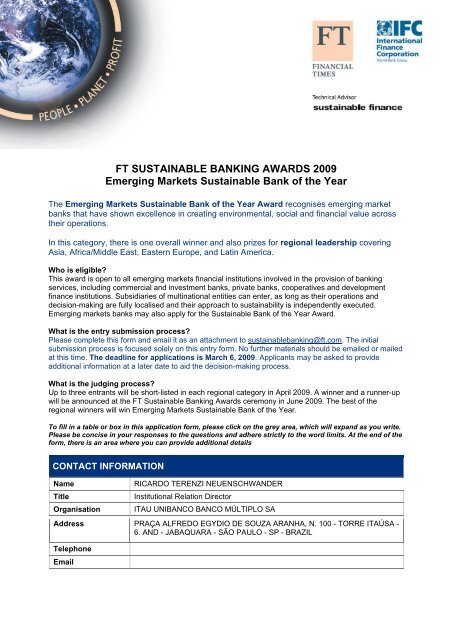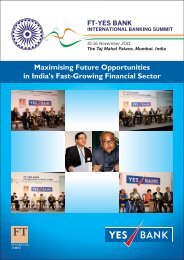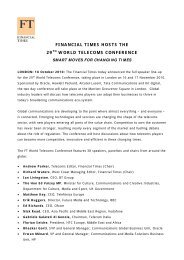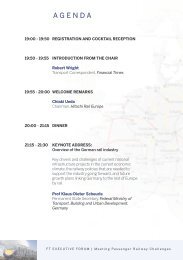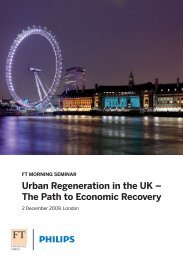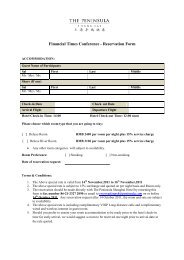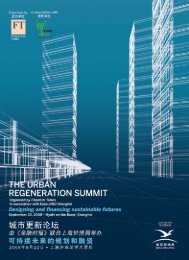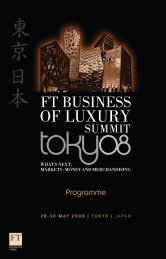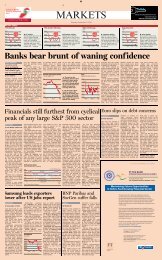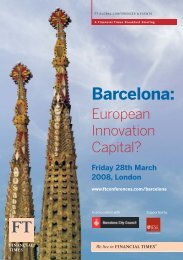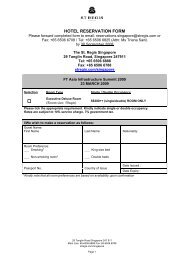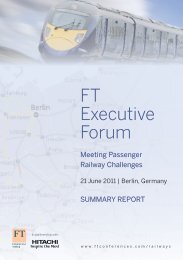FT SUSTAINABLE BANKING AWARDS 2009 Emerging Markets ...
FT SUSTAINABLE BANKING AWARDS 2009 Emerging Markets ...
FT SUSTAINABLE BANKING AWARDS 2009 Emerging Markets ...
You also want an ePaper? Increase the reach of your titles
YUMPU automatically turns print PDFs into web optimized ePapers that Google loves.
<strong>FT</strong> <strong>SUSTAINABLE</strong> <strong>BANKING</strong> <strong>AWARDS</strong> <strong>2009</strong><br />
<strong>Emerging</strong> <strong>Markets</strong> Sustainable Bank of the Year<br />
The <strong>Emerging</strong> <strong>Markets</strong> Sustainable Bank of the Year Award recognises emerging market<br />
banks that have shown excellence in creating environmental, social and financial value across<br />
their operations.<br />
In this category, there is one overall winner and also prizes for regional leadership covering<br />
Asia, Africa/Middle East, Eastern Europe, and Latin America.<br />
Who is eligible?<br />
This award is open to all emerging markets financial institutions involved in the provision of banking<br />
services, including commercial and investment banks, private banks, cooperatives and development<br />
finance institutions. Subsidiaries of multinational entities can enter, as long as their operations and<br />
decision-making are fully localised and their approach to sustainability is independently executed.<br />
<strong>Emerging</strong> markets banks may also apply for the Sustainable Bank of the Year Award.<br />
What is the entry submission process?<br />
Please complete this form and email it as an attachment to sustainablebanking@ft.com. The initial<br />
submission process is focused solely on this entry form. No further materials should be emailed or mailed<br />
at this time. The deadline for applications is March 6, <strong>2009</strong>. Applicants may be asked to provide<br />
additional information at a later date to aid the decision-making process.<br />
What is the judging process?<br />
Up to three entrants will be short-listed in each regional category in April <strong>2009</strong>. A winner and a runner-up<br />
will be announced at the <strong>FT</strong> Sustainable Banking Awards ceremony in June <strong>2009</strong>. The best of the<br />
regional winners will win <strong>Emerging</strong> <strong>Markets</strong> Sustainable Bank of the Year.<br />
To fill in a table or box in this application form, please click on the grey area, which will expand as you write.<br />
Please be concise in your responses to the questions and adhere strictly to the word limits. At the end of the<br />
form, there is an area where you can provide additional details<br />
CONTACT INFORMATION<br />
Name RICARDO TERENZI NEUENSCHWANDER<br />
Title Institutional Relation Director<br />
Organisation ITAU UNIBANCO BANCO MÚLTIPLO SA<br />
Address PRAÇA ALFREDO EGYDIO DE SOUZA ARANHA, N. 100 - TORRE ITAÚSA -<br />
6. AND - JABAQUARA - SÃO PAULO - SP - BRAZIL<br />
Telephone<br />
1. SUMMARY OF STRATEGIC APPROACH<br />
Please summarise the bank’s overall sustainability approach, e.g. financing of renewables, Bottom of<br />
the Pyramid finance, environmental and social risk management -- identifying the main environmental,<br />
social and governance (ESG) benefits resulting. (400 words max)<br />
Summary of approach:<br />
The model of activity focused on sustainable development and sustainable corporate practices has<br />
been discussed for long at Itaú and Unibanco, yet not in structured way. Therefore, to search for an<br />
adequate economic performance – with increasing results, necessary to support the development of<br />
emerging societies –, based on values and principles that privilege the social balance and<br />
environmental responsibility is the vocation of both companies. The merger of the two institutions<br />
announced on November 3rd, 2008, gave birth to Itaú Unibanco Multiple Bank, the largest private bank<br />
in the Southern Hemisphere, and one of the world’s twenty largest in market value, and such vocation<br />
has become an strategic director with large transforming potential. The over 35 million clients in<br />
diversified banking business segments that could have access to bank branches, customer attention<br />
facilities, and ATMs in more than 1,100 cities all over Brazil, became participants in the creation of the<br />
largest capacity pole to disseminate sustainable activities and practices in view of the increased<br />
capacity, penetration, and amplitude of the new institution.<br />
From such strategy, products, services and initiatives are consolidated to contribute to sustainable<br />
development such as:<br />
- Social-Environmental Risk Policy Credit;<br />
- FIES Fund (Fundo Itaú Excelência Social);<br />
- Itaú Ecomudança Fund;<br />
- Specific credit lines to foster renewable energy projects and companies, such as PROESCO and<br />
JBIC;<br />
- Microfinance operations, as the first Brazilian bank to extend micro-credit operations;<br />
- Programme for financial education for the conscious use of credit, credit card, etc.<br />
The year <strong>2009</strong> sets the start of building a new internal culture, combining the best from Itaú and<br />
Unibanco. The task will be alleviated by modernity traces common to both institutions, benchmarks in<br />
customer and employee management, in building long-lasting relations, in technology usage for<br />
increased efficiency, such as the IT Green Programme, implemented in technology areas, one of the<br />
banking most consuming impacts.<br />
The convergence has allowed for the creation, as soon as in the end of 2008, of the Itaú Unibanco<br />
Sustainability Policy and, after the merger was approved by the Brazilian Central Bank on February 18,<br />
<strong>2009</strong>, it will be endorsed by the new Executive Committee.<br />
Summary of key sustainability benefits:<br />
Environmental Social Governance<br />
Energy saving<br />
Water use reduction<br />
Waste management<br />
Climate change<br />
Biodiversity conservation<br />
Other<br />
please describe:<br />
Bottom of the<br />
Pyramid<br />
Disadvantaged<br />
communities<br />
Women<br />
Poverty reduction<br />
Other<br />
please describe:<br />
Quality improvement in<br />
public education<br />
Cultural preservation<br />
2. IMPLEMENTATION: HOW DO YOU IMPLEMENT THIS STRATEGY?<br />
Revenue transparency<br />
Management systems<br />
Institution building<br />
Other<br />
please describe:
Please describe in detail the following elements of your institution’s approach for implementing this<br />
strategy.<br />
BUSINESS PRINCIPLES: What overall business principles has the institution adopted?<br />
Business Principle Comment (30 words max in each case)<br />
UNEP-FI Declaration A member of UNEP-FI and Task Force Latin America, aiming at<br />
assisting in the dissemination of contents and financial sustainable<br />
practices to other financial institutions.<br />
Equator Principles Itaú is a signatory of the Equator Principles and, since 2008, is in the<br />
chair of the Steering Committee, the first representative from an<br />
emergent country.<br />
Global Compact We are part of the Brazilian Committee of the Global Compact, a group<br />
of Brazilian companies that guide, facilitate and encourage the<br />
development of programmes related to the Compact’s Ten Principles<br />
Carbon Disclosure<br />
Project<br />
Itaú Unibanco is a signatory and respondent of CDP. In Latin America,<br />
we are master sponsors of the initiative, encouraging its expansion into<br />
the region.<br />
Other Greenhouse Gas Protocol (GHG Protocol) – Itaú and Unibanco use the<br />
methodology in their GHG inventories. In 2008, the Brazilian<br />
programme was announced, with Itaú as a founding member.<br />
Latin American Sustainability Financial Forum (LASFF) – Itaú and<br />
Unibanco participate in the forum’s activities, developed with the<br />
objective to foster sustainable finances in Latin America.<br />
All for Education – An alliance endeavouring to ensure quality basic<br />
education to all Brazilians by 2022. Itaú Social Foundation is a member<br />
of the Board and a supporter organisation.<br />
National Pact for Eradication of Forced Labour – Itaú is a signatory of<br />
the Pact since 2008 and, as part of its commitment, involves its entire<br />
value chain, including own employees, outsourced workers, suppliers<br />
and clients.<br />
Principles for Responsible Investment – Unibanco Asset Management<br />
(UAM) was the first major asset manager in Brazil to adhere to PRI, in<br />
July 2008.<br />
SPECIFIC POLICIES: What specific aspects below are addressed in your corporate policies and<br />
standards relating to sustainability? Please describe.<br />
Policy Comment (30 words max in each case)<br />
Risk Management Since 2007, Itaú Unibanco develops specific policy to assess socioenvironmental<br />
risks in corporate customer segment from its<br />
experience with the Equator Principles.<br />
Sustainable Business<br />
Opportunities<br />
Sustainability Policy includes socio-environmental aspects in the<br />
organisation’s management, products and services, and customer<br />
and supplier relations.
Environmental protection Sustainability and Socio-Environmental Risk Policies for corporate<br />
customers established guidelines for integration of businesses to<br />
preservation of natural resources. As an example, Corporate<br />
Customer asset management contracts have specific clauses on<br />
environmental responsibility.<br />
Human rights As part of Sustainability Policy guidelines is: “protect and respect<br />
the human rights in our value chain, refusing all forms of child,<br />
forced or compulsory labour”.<br />
Climate change As part of Sustainability Policy guidelines is: “include aspects<br />
related to climate changes, focusing on the development of<br />
solutions to reduce greenhouse gas emissions”.<br />
Child labour The Sustainability Policy has a directive; contracts with suppliers<br />
have clauses forbidding; and the topic is part of the socioenvironmental<br />
risk assessment.<br />
Predatory lending/sub<br />
prime<br />
Indigenous Peoples<br />
Risk Management Policy establishes safe levels for the credit area,<br />
and the bank has specific structure to anticipate requirements from<br />
the New Basel Accord.<br />
Defence The bank has Code of Ethics and a number of policies and<br />
programmes: treatment of complaints, anti-corruption, prevention<br />
and fight against illicit acts, risk management, legal compliance, etc.<br />
Water<br />
Forestry<br />
Cultural property Itaú Unibanco has a long track record in preservation and<br />
propagation of Brazilian culture through its Institutes created<br />
specifically for such an end.<br />
Other (please describe) Quality improvement in public education – The bank formally<br />
directed its private social investment in support of education. Other<br />
actions related to the Code of Ethics: diversity; free labour union<br />
association; labour relations; financial safety; external relations.<br />
ENVIRONMENTAL AND SOCIAL RISK MANAGEMENT PROCEDURE: Please describe a typical<br />
project finance or corporate finance transaction, illustrating the roles of key team members in mitigating<br />
environmental and social risks. (400 words max)<br />
The same way it applies sustainability principles in its products and services, Itaú Unibanco also<br />
incorporates socio-environmental criteria in analyses for credit extension, so as to mitigate operation<br />
risks, to encourage clients to adopt responsible practices, and to contribute to sustainable development.<br />
The objective is to go beyond socio-environmental risk identification and compliance with legal<br />
requirements, i.e., build a relationship with our clients and convey an inclusive positioning, multiplier<br />
and developer of good social environmental practices.<br />
Since 2007, Itaú, as per its Socio-Environmental Risk Policy for Credit, adopts socio-environmental<br />
criteria in the analysis of credit operations above R$ 5 million for corporate customers in the Brazilian<br />
conglomerate. For the banks Banco Itaú Chile S.A., Banco Itaú Uruguay S.A., Banco Itaú Buen Ayre<br />
S.A. and Banco Itaú Europa S.A., own analysis processes will be developed in <strong>2009</strong> and 2010,<br />
considering specifics of each institution. The same way as other policies that Itaú and Unibanco<br />
developed separately, the Socio-Environmental Risk Policy for Credit will be unified in <strong>2009</strong>,<br />
comprehending Itaú Unibanco.<br />
In addition, the entire Itaú Unibanco social environmental team is updated on the topic and training will<br />
be multiplied this year for several areas of the bank, related to credit extension and corporate customer<br />
attention.<br />
Itaú Unibanco is a signatory of the Equator Principles since 2004. Unibanco is the first financial<br />
institution from an emerging country to adhere to the Principles By adopting the guidelines we are
committed to finance projects developed in socially fair and environmentally responsible fashion, based<br />
on internationally recognised criteria such as Performance Standards by IFC - International Finance<br />
Corporation. The Equator Principles are also applied when the bank simply acts in project structuring<br />
consultancy. In the socio-environmental analysis and monitoring of large enterprises (US$ 10 million<br />
plus), it provides benefits for the banks, its clients, and the entire society.<br />
Socio-Environmental Risk Analysis – examples of assessed items<br />
• Use of child labour in hazardous and/or exploration way<br />
• Environmental Legislation<br />
• Sector Directives<br />
• Public Information.<br />
In the scope of the function and endeavoured to expand its socio-environmental awareness, add value<br />
to debates, and boost the financial sector in that direction, we led, in partnership with IFC and other<br />
Brazilian banks signatory of the Equator Principles, in December 2008, the organisation of the Regional<br />
Latin-American Meeting celebrating the 5th Anniversary of the Equator Principles. Gathered in Rio de<br />
Janeiro, important actors in the global socio-environmental scenario celebrated the milestone and<br />
debated the challenges that lie ahead.<br />
CAPACITY BUILDING: How has your organisation built capacity to manage sustainability issues?<br />
Please describe specialist hires and/or groups who have received sustainability training. (400 words<br />
max)<br />
There are qualification programmes for specialists and managers with modules in sustainable finance<br />
management, comprehending the focus on transforming values for a more effective sustainability<br />
action. E-learning in Sustainability is a way to reach the largest possible number of employees,<br />
approaching the main gaps of the institution regarding the topic and introducing concepts and values<br />
required to internalise the sustainability issue.<br />
Complementing the action, in 2008, Itaú held two editions of its event called Itaú Sustainability<br />
Dialogues for employees aiming at deepening their understanding and for mobilisation. The selected<br />
theme was “Recycling under Different Views”. The meetings relied on the participation of the Papel<br />
Voluntário NGO and the Business Commitment for Recycling (CEMPRE), and also gave space for<br />
other companies report their experiences. The event was attended by 307 employees from Itausa<br />
Business Centre and Technical Operational Centre.<br />
Itaú employees are also target in the campaign Conscious Use of Cash, Credit Card, and Credit.<br />
Extended to the internal public since 2007, the initiative aims at keeping the team’s well-being, by<br />
preventing employee indebtedness, and guiding them in case their debts would possibly impact their<br />
performance and life quality.<br />
Unibanco created the Sustainability Leaders, a group that gathers 35 employees from several areas<br />
aiming at disseminating the concept throughout the organisation and at implementing projects in their<br />
own sectors. Leaders are distributed in 12 working groups (GTs) and one study group, coordinated by<br />
the Sustainability area. Each GT prepared its action plan including design of strategies, formulation of<br />
policies, and minor daily changes.<br />
In order to prepare action plans that would allow reaching established goals, Leaders attended<br />
meetings and training. One of such was the Training on Sustainable Finances promoted by Unibanco<br />
and conducted by Fundação Getúlio Vargas and Fábrica Éthica.<br />
Itaú Unibanco relies on an extensive network of partnering specialists for lectures to employees and<br />
specific training. Some examples are:<br />
• Support to British consultants SustainAbility and the Brazilian Foundation for Sustainable<br />
Development (FBDS) in preparing the Way to Credibility study, analysis of leading sustainability reports<br />
in Brazil;<br />
• Membership with the Institute of Social and Ethical Accountability, part of a global network of<br />
companies committed to sustainability;<br />
• Since 2007, Itaú is part of the Benchmark Group in Sustainability Strategy, Ethos Institute of<br />
Corporate Social Responsibility (GRES);<br />
• Itaú and Unibanco are part of the Centre for Reference in Sustainability, coordinated by<br />
Fundação Dom Cabral, promoting studies and debates on sustainable development.
RESOURCES: Please describe the sustainability resources available within the bank (e.g. renewables<br />
specialists, environmental and social risk managers, micro-credit specialists, sustainability learning<br />
specialists, carbon credit expertise). (400 words max)<br />
Itaú Unibanco has a consolidated sustainability governance structure consisting of: Sustainability<br />
Committee, and specific working groups for strategic topics such as climate changes and development<br />
of sustainable businesses. The highest body, for decision-making in sustainability-related activities to<br />
be implemented is the Sustainability Committee. There is also the Itaú Unibanco Superintendence of<br />
Sustainability that is a formal structure consisting of 14 professionals dedicated to technically support<br />
the several areas of the organisation in deepening their sustainable development practices in daily<br />
activities. It is also responsible for articulating a number of initiatives which would generate knowledge<br />
for the benefit of the bank and the market at large. It serves also to connect external and internal<br />
specialist networks.<br />
Several areas of the bank have professionals dedicated to sustainability-related matters: corporate<br />
customer products and services, socio-environmental compliance, risk analysis, insurance and microcredit.<br />
The Area of Products for Corporate Customers (DPPJ), for instance, relies on two professionals<br />
entirely focused on sustainability issues in business (a specialist in environmental management and an<br />
environmental engineer). Their mission is to provide updated technical information and to follow up<br />
good practices in the market and competition to stimulate the insertion of social and environmental<br />
aspects in products, services and businesses, whilst not neglecting the financial economic excellence.<br />
In the structure of Unibanco, the group of Sustainability Leaders consists of 35 professionals from<br />
several specialties and areas of the bank. The network is supposed to gather around 120 people within<br />
Itaú Unibanco.<br />
It is worth stressing that Itaú was named in September 2008 to occupy the leadership position at the<br />
Equator Principles for one year, presiding over the Steering Committee. It was the first time a financial<br />
institution from an emerging country becomes the group leader. Itaú Unibanco is also at the forefront of<br />
the Sustainability Commission of the Brazilian Federation of Banks (Febraban).<br />
Focused on the 2 thousand largest Brazilian enterprises, Itaú Unibanco participates in the following<br />
Equator Principles working groups: Climate Change, Best Practices in Hydro Energy, Best Practices in<br />
Contractual Commitments, Scope Review, Outreach (action especially in Latin America and China),<br />
and Social Issues.<br />
INCENTIVES: Are there specific incentives for sustainability performance? (400 words max)<br />
Itaú Unibanco is advancing in the process of implementing sustainability in all its activities and<br />
performance-related incentive practices are adopted according to the stage of each area or<br />
business unit. Socio-environmental criteria are increasingly inserted in performance evaluation.<br />
For instance, variable compensation for employees at the Area of Products for Corporate<br />
Customers is directly connected to achievement of their annual goals. Naturally, the same<br />
happens in the areas of governance, socio-environmental resource management, socioenvironmental<br />
risk management, sourcing, among others.<br />
The incentive to the insertion of socio-environmental aspects in businesses can also occur in<br />
other ways. As an example, the Corporate Customer Product Area created the DPPJ Award on<br />
Socio-Environmental Responsibility. The 1st edition was held in 2008 and all participants<br />
received a Participation Certificate and awarded programmes were given trophies made of<br />
certified wood.<br />
Another specific incentive, created by the Treasury Area, is the “Olympiad of Ideas”, in which a<br />
selection criterion is the incorporation of sustainability concepts in the submitted project.<br />
On the other hand, volunteer employee engagement in social causes is encouraged by the Itaú<br />
Volunteer Programme, with technical coordination of the Sao Paulo Volunteering Centre, and<br />
promoted 12 regional meetings for over 940 employees from bank branches. The bank has also<br />
the Itaú Volunteer Gateway (www.ivoluntarios.org.br), with information on events,<br />
communication networks, interviews with specialists and volunteers. The website ended 2008<br />
with 3,491 registered users, a 26.6% increase over the previous year.<br />
Itaú Unibanco also makes use of its procurement capacity of about R$ 8.5 billion a year to<br />
encourage suppliers to adopt reference socio-environmental practices. Contracts include<br />
restrictions and penalties for child labour, forced labour and any kind of discrimination.<br />
In another example of action front Unibanco encourages chartered transportation of employees
to work. All expenses with such commuting mode are reimbursed to employees. As a<br />
consequence, the Bank stimulates collective transportation, thus improving its own efficiency<br />
in greenhouse gas emissions per km per employee. About 1 thousand employees adhered to<br />
the initiative.<br />
STAKEHOLDER ENGAGEMENT: Please list the stakeholders with whom the bank engages in<br />
communicating and reviewing performance (e.g. raters, analysts, NGOs). (400 words max)<br />
Itaú Unibanco believes that for the achievement of an effective sustainable development<br />
process it is fundamental to have ethical, transparent and lasting relations with all publics,<br />
directly or indirectly involved in its operations.<br />
To add effectiveness to this process of dialogue, interaction and continuous improvement, the<br />
Bank identified its main stakeholders: at the company’s dimension, the employees and family<br />
members; at the market’s dimension, clients, consumers, shareowners, investors, suppliers and<br />
competitors; at society’s dimension, governments, NGOs, civil society organisations of public<br />
interest, partners, community, media, universities, and entities (such as Sustainable Amazon<br />
Forum, Sustainable Cattle Raising, UNEP-FI, Latin America Sustainable Finance, IFC – Equator<br />
Principles, Accountability, among others).<br />
In the preparation of the Annual Sustainability Report 2008, to be released in April <strong>2009</strong>,<br />
representatives of such publics were consulted with for improvement opportunities in Itaú<br />
Unibanco reporting. Opinion from specialists and market best practices were also considered.<br />
Itaú Unibanco has consolidated interaction activities with many of those publics. With clients,<br />
for instance, it created the Customer Council in 2005, a quarterly forum gathering<br />
representatives from segments Uniclass, Personnalitè, Private and Exclusivo, with annual<br />
terms. It aims at listening to suggestions and criticism for improving the institution’s attention<br />
quality.<br />
Itaú Unibanco already had a number of measures to increase customer satisfaction, such as<br />
Councils of General Managers and Quality Guardians, consisting of branch managers from all<br />
regions of the country. The Councils aim at identifying tangible suggestions and criticism,<br />
always in search for improvement in attention quality.<br />
To expand the comprehensiveness of programmes Conscious Use of Credit and Conscious Use<br />
of Checking Account, in 2008, Itaú developed four new booklets distributed to clients at the<br />
branches and employees, continuing with the Programme for Conscious Use of Cash.<br />
In 2006, Itaú created Itaú Sustainability Dialogues, focused on disseminating experiences from<br />
several companies and to open space for debates on good national and international practices.<br />
In 2008, four editions were open to external public – trying to involve corporate customers – on<br />
topics such as carbon credit market, sustainability in businesses, and energy efficiency.<br />
Meetings gathered about 700 people.<br />
The Investor Relations area has established practices with shareholders, individual and<br />
corporate investors, market analysts, regulatory bodies, national and international capital<br />
market entities, financial media, and academicians studying financial and capital markets. The<br />
president of the Brazilian Institute of Investors is the Superintendent of Investor Relations.<br />
MONITORING AND REPORTING: How do you monitor and report on performance for key<br />
stakeholders? (400 words max)
Itaú Unibanco uses monitoring instruments and accountability, aligned with internationally<br />
recognised frameworks such as the Global Compact, Equator Principles, Global Reporting<br />
Initiative (GRI) guidelines, and AA1000 and SA 8000 standards. The practices are also guided by<br />
trends indicated by the Dow Jones Sustainability Index (NYSE) and the Corporate Sustainability<br />
Index of the Sao Paulo Stock Exchange (ISE-Bovespa), among other references.<br />
In 2006, Itaú started implementation of AccountAbility 1000 (AA1000), international management<br />
standard, recognised as corporate excellence practice, establishing criteria for processes of<br />
information collection, auditing and reporting, focused on dialogue with strategic publics. The<br />
project will take five years, 2006-2010, in a three-stage implementation: the first is intended for<br />
learning the standard, and the others for incorporation into the relationship with stakeholders.<br />
Itaú incorporated its sustainability reporting based on GRI guidelines into its four-decade<br />
experience with annual reports. Since 2007, it achieved A+ application level, with assurance and<br />
GRI-checked. Unibanco, in turn, adopted GRI as from 2008, and the report to be released at the<br />
end of March <strong>2009</strong> – only five months after the merger – will already feature specific GRI<br />
standard reporting. The report is also used as Communication on Progress (COP) of initiatives<br />
adopted under Global Compact principles.<br />
One month after the merger, Itaú Unibanco held an open meeting for the capital market in Sao<br />
Paulo to present the first projections of the new bank. The event, as part of the Apimec calendar<br />
(Association of Capital Market Analysts and Investment Professionals), had record-breaking<br />
attendance, was broadcast over the internet, with simultaneous translation into English and<br />
Spanish.<br />
Itaú Unibanco Holding’s system for communications with the Market/main stakeholders also<br />
includes:<br />
• Investor Relations website in three languages (Portuguese, English and Spanish);<br />
• Quarterly Shares in Focus newsletter, distributed to all shareholders since March 2004;<br />
• Quarterly Reports, including Management’s Discussion and Analysis of Financial<br />
Condition and Results of Operations;<br />
• Sending of e-mails to over 12,000 people registered on the company’s mailing list;<br />
• Meeting with analysts in Brazil (Apimec Meeting) and Abroad (Road shows);<br />
• Chat about the results with individuals.<br />
SCOPE OF APPLICATION: To what extent is the institution’s sustainability approach mainstreamed<br />
across key business lines and geographies? Please appraise the current level of implementation,<br />
commenting frankly on both gaps and successes. (100 words max in each section)<br />
Percentage of 2008 business<br />
volume in sustainable<br />
businesses (including<br />
renewables, Bottom of the<br />
Pyramid finance, carbon<br />
markets, etc.)<br />
Historic growth rate of<br />
sustainable business volume<br />
Strategic plan for growth of<br />
sustainable business lines<br />
The business volume in 2008 related to the strategy of attention and<br />
inclusion at the bottom of the pyramid was estimated as about R$<br />
200 million for microfinance, through federal legislation in support to<br />
micro-credit, and additional R$ 14 million for Social Organisations in<br />
Guided Productive Micro-Credit. The Ecomudança Fund transfers<br />
30% of its administration fee to leverage businesses focused on<br />
reduction of greenhouse gas emissions, benefiting projects on small<br />
generation of renewable energy, but with possibility for replicability<br />
and scalability. For <strong>2009</strong>, other funds, according to PRI, will be<br />
developed to increase the Itaú Unibanco participation in the<br />
segment.<br />
Corporate Governance, FIES and Ecomudança funds, among<br />
others, generated assets of about R$ 3 billion. Other credit lines with<br />
socio-environmental risk analysis extended credits of R$ 2.8 million.<br />
A pioneer initiative in the market, Ecomudança Fund, in a single<br />
year of operation, attracted assets of R$ 200 million from the<br />
market. Together with that operation, Itaú Unibanco leveraged other<br />
investment products and credit lines which generated businesses<br />
around R$ 3.2 billion. Even with the global financial crisis, those<br />
products have not been drastically affected. The amount does not<br />
include credit lines with collection in international organisms such as<br />
IIC and IFC.<br />
Through its Sustainability Policy, Itaú Unibanco reinforces its<br />
position and concern about the strengthening of sustainable aspects<br />
in the organisation. The Policy establishes the following points<br />
regarding products and services:
Level of application of<br />
environmental and social risk<br />
management across key<br />
business lines<br />
Level of application of<br />
environmental and social risk<br />
management across key<br />
geographies<br />
• insert sustainability aspects in the conception of new<br />
products and services, prioritizing innovation and the creation of a<br />
sense of opportunity in face of new society requirements and global<br />
demand;<br />
• identify business opportunities which would result in<br />
financial inclusion and support of those who are still excluded from<br />
benefits of such products and services;<br />
• stimulate businesses in new markets aligned with<br />
sustainable development.<br />
The integration of bank activities over the next two years will be an<br />
excellent opportunity to enhance sustainability within new structures.<br />
The Bank strategies, in upcoming years, are turned to perfecting<br />
operations in sustainable finances and their impact in the<br />
sustainable development.<br />
In 2008, the Itaú Socio-Environmental Risk Policy reached 1,116<br />
projects under assessment, against about 200 in the previous year.<br />
Of the total, only 19 projects have been approved, while other 10<br />
were rejected. For corporate finance with Banco Itaú Holding<br />
Financeira, assessed within Socio-Environmental Risk Policy,<br />
investments reached R$ 2,829,785.00.<br />
In the scope of the Equator Principles, in 2008 Unibanco assessed<br />
13 projects, representing investments of R$ 2,800,000. With Itaú, 11<br />
projects from risk sectors such as sugar & alcohol and electric<br />
energy have been approved, with investments of R$ 3,551,178, with<br />
Itaú BBA participation of R$ 825.351.<br />
Itaú Unibanco already has activities in important international<br />
markets, with branches and subsidiary banks in Europe, USA, Asia,<br />
Latin America and Caribbean. Operations reach the entire Mercosur<br />
– Brazil, Argentina, Uruguay, Paraguay and Chile.<br />
With the merger, the new bank with provide further support to<br />
Brazilian companies with international business. In Brazil, the use of<br />
socio-environmental risk analysis is implemented with ongoing<br />
enhancements. From <strong>2009</strong>, own processes for socio-environmental<br />
analysis will be developed for operations in countries of Europe and<br />
South America, already submitted to the Equator Principles.<br />
FUTURE STEPS: Are there any enhancements to the institution’s approach or desired next steps that<br />
would add further value? (400 words max)<br />
The Itaú-Unibanco merger will provide the Latin American region with a financial institution with<br />
scale and able to compete globally, increasing credit extension, contributing for a new<br />
economy, and disseminating the sustainable development. The structure gathers one of the<br />
best professional bodies of the Brazilian and Latin American financial system, and represents<br />
an excellent opportunity to consolidate an organisational culture turned to sustainability.<br />
After defining a sustainability policy and incorporating the topic into its governance structure,<br />
Itaú Unibanco accelerates the process of education and internal dissemination of sustainable<br />
development concepts. It is worth remembering that, along 2008, the Bank played a leading role<br />
in the movement of sustainable finances in Brazil and Latin America, with the articulation of an<br />
extensive network of partners in society, and is aware of its responsibility as leader. Therefore,<br />
it endeavours to deepen the understanding and the practice in the universe of 114 thousand<br />
employees, to expand the insertion of socio-environmental criteria in doing business, and in the<br />
formal performance evaluation, turning sustainability management into a systematic process in<br />
the company.<br />
Another great future opportunity is the acceleration of the activities turned to the bottom of the
pyramid, with which Itaú Unibanco intends to create sustainable, affordable mechanisms to<br />
extend credit to low income public. The bank believes that this financial service mode will allow<br />
for a wider activity in the financial market with engagement of efforts to reduce poverty and<br />
social exclusion. For its features, micro-credit is a swift, effective tool for income generation<br />
and represents a powerful mechanism for social insertion, reflecting in education and life<br />
quality for the population at the bottom of the pyramid.<br />
In addition, Itaú Unibanco is preparing its greenhouse gas emission inventory based on the<br />
GHG Protocol and investing in business strategies for Climate Changes, by creating products<br />
and services that will meet the demand for opportunities generated by such a pressing market.<br />
3. BUSINESS RESULTS: WHAT ARE THE MAIN BUSINESS RESULTS FROM YOUR<br />
SUSTAINABILITY APPROACH?<br />
Please describe concrete benefits your institution has achieved or aims to achieve through<br />
implementation of its sustainability strategy, e.g. “Employees: 78% of bank staff indicate that the bank’s<br />
social and environmental policies are a factor supporting their choice of the bank.” Please select N/A<br />
(not applicable) to denote any business lines or benefits not relevant to the bank. (200 words max in<br />
each section)<br />
BUSINESS GROWTH<br />
New sectors: Winning market share in new sectors e.g. renewables (if yes, please indicate volume as<br />
a percentage of total business).<br />
YES/NO / N/A<br />
Itaú Unibanco faces the socio-environmental variable as an opportunity to become an agent of change.<br />
Therefore, it offers financing lines to stimulate corporate customers to adhere to good sustainable<br />
practices.<br />
Itaú collected US$ 150 million with the Inter-American Investment Corporation between 2005 and 2006.<br />
The resources were intended for finance of small and mid-sized companies, in automatic leasing<br />
operations. The receivers underwent socio-environmental risk assessment under the IIC requirements.<br />
In April 2008, Unibanco and IFC (International Finance Corporation - the financial arm of World Bank)<br />
signed an agreement for the establishment of a credit line turned to financing projects and activities<br />
connected to good practices, such as clean production, renewable energy, and sustainable building.<br />
The US$ 75 million credit line is the fourth IFC project with Unibanco, and the first focused on<br />
sustainability.<br />
To foster technologies and projects to assist the fight against global warming, in 2007 Unibanco<br />
signed the first agreement between Brazil and Japan for CDM project financing (Clean Development<br />
Mechanism) according to the Kyoto Protocol. The outcome was the institution of a credit line of US$ 50<br />
million, in a term of 12 years, for the market of carbon credits.<br />
Corporate clients: Differentiating the bank for corporate clients through new products and services,<br />
e.g. carbon credits.<br />
YES/NO / N/A<br />
The segments of wholesale and investment bank, for companies with annual revenues in excess of R$<br />
150 million, have become even more competitive with the merger of Itaú and Unibanco. Itaú BBA and<br />
the Unibanco’s wholesale segment have the same target customers: about two thousand companies in<br />
the country meet the profile. The customers will benefit from the increased credit extension capacity of<br />
the new bank and the possibility of a joint, wider sustainable approach.<br />
Itaú and Unibanco wholesale and investment bank operations merged into Itaú BBA, which<br />
remained independent within the new structure. The investment bank has international coverage and<br />
sector expertise, directed for long-term relationship also with corporate investors.<br />
During the year, Itaú BBA maintained strong growth rate in corporate customers, treasury,<br />
international, and investment banking activities. The Corporate area of Itaú Unibanco participated in<br />
operations of debentures and promissory notes, totalling R$ 20.1 billion, and securitisation operations<br />
totalling R$ 2 billion In variable income it acted as coordinator and bookrunner of initial and
subsequent public offering, totalling R$ 31.8 billion. In 2008, Itaú BBA was considered the best<br />
Investment Bank in Brazil by Global Finance.<br />
SME clients: Differentiating the bank for SME clients through new products and services, e.g. cleaner<br />
production, energy efficiency financing.<br />
YES/NO / N/A<br />
Products for micro, small and medium-sized companies consist of transactions with receivables<br />
guarantee, overdraft secured check, guaranteed account, working capital, and BNDES/Finame funds,<br />
among others. The products allow for cross-sales activities, such as payrolls, and affiliation of store<br />
owners and credit card partner companies. Among the innovations implemented in 2008 we highlight:<br />
• Mobile service allowing for operations through mobile phone, including fund transfers, payment<br />
authorizations, and product acquisition.<br />
• Express Collection is an online issuance service allowing for contracting and issuance of<br />
payment slips over the internet.<br />
• Online exchange allows for timely contracting of exchange operations and foreign trade<br />
services.<br />
For small and medium companies we have:<br />
- Giro Socioambiental, financing projects, goods, and services aiming at environmental improvements<br />
such as, for instance, the adoption of less aggressive technologies and certifications.<br />
- PROESCO, intended for finance of projects contributing to reduce consumption and for rational use of<br />
energy (energetic efficiency).<br />
- The use of technology can contribute to reduce impacts of economic activities in the environment.<br />
Therefore, our products and services use more electronic solutions, such as website collection, email<br />
collection, and online currency exchange.<br />
- Itaú Mobile service allows for operations through mobile phone, including fund transfers, payment<br />
authorizations, and product acquisition.<br />
- And the IIC Socio-Environmental Finance is a credit line of US$ 150 million for small and mid-sized<br />
companies in automated leasing operations, according to eligibility criteria by IIC and Banco Itaú.<br />
In 2008, Banco Itaú, in partnership with Itautec, Microsoft and the magazine ‘Pequenas<br />
Empresas, Grandes Negócios’, held the 3rd edition of project Extreme Makeover, which is transforming<br />
companies through changes in the areas of technology and financial management. The 2008 version<br />
included social and environmental consultancy to participants and tried to evidence that sustainability is<br />
a subject also for micro and small companies.<br />
Retail clients: Winning credit card and checking account clients through sustainability.<br />
YES/NO / N/A<br />
Itaú Unibanco has strong activities in the segment of credit cards in Brazil. The merger, involving<br />
Itaucard, Unicard, Hipercard and Redecard, produced the largest credit card issuer in the country. The<br />
bank has a number of credit cards contributing to causes connected to sustainability, such as Aqualung<br />
Unicard (environmental education), Greenpeace Unicard (finances the NGO in environmental protection<br />
activities), Fundação Abrinq Unicard (life quality improvement for children and adolescents), and Lions<br />
Unicard (fight against blindness). Total funds for socio-environmental cards reached R$ 190,600.59 in<br />
2008.<br />
Specializing in credit for low income clients, Fininvest is market leader in personal credit products and<br />
services, credit card, direct consumer credit, insurance and capitalization. In 2008, Fininvest promoted<br />
sales of R$ 2.2 billion, with 3.2 million active customers and over 6.7 million credit cards.
Another way to contribute to sustainable development in the country is to assist education and<br />
professional qualification. With the idea, Unibanco created the University Credit to finance higher<br />
education, in partnership with universities, thus contributing to prepare the young for the job market.<br />
Wholesale/project finance clients: e.g. positioning the bank as lead arranger capable of handling<br />
complex transactions.<br />
YES/NO / N/A<br />
Itaú Unibanco offers financing lines which stimulate good sustainability practices. With the<br />
agreement signed with the International Finance Corporation (IFC), Unibanco now offers a credit line of<br />
US$ 75 million for projects such as clean production, renewable energy, and sustainable building. US$<br />
40 million have already been invested.<br />
To foster technologies and projects assisting in the fight against global warming, Unibanco<br />
signed in 2007 the first agreement between Brazil and Japan for CDM project financing (Clean<br />
Development Mechanism) according to the Kyoto Protocol. The agreement produced a line of US$ 50<br />
million for the market of carbon credits.<br />
Itaú, in turn, signed a contract in April 2008 with the National Bank for Economic and Social<br />
Development (BNDES) to extend the Proesco line (Programme for Support of Projects in Energetic<br />
Efficiency). The objective is to foster projects which contribute to reduce consumption and for rational<br />
use of energy, by financing studies, installations, equipments, and specialized services. With the<br />
contract, Itaú become the first private bank in the country able to perform shared-risk operations with<br />
BNDES.<br />
Asset management: Gaining asset management funds, or enhancing fund performance through<br />
sustainability.<br />
YES/NO / N/A<br />
Itaú Unibanco is the largest asset manager in the country, with R$ 217 billion under management. In<br />
September 2008, Unibanco Asset Management (UAM) became the first major Brazilian asset manager<br />
to adhere to PRI - Principles for Responsible Investment of the United Nations (UN). UAM saw its<br />
market share in the Anbid global ranking jump from 4.7% in December 2007 to 5.3% in December<br />
2008. Unibanco Asset Management finished 2008 with a growth of 10.9% in assets under<br />
management, reaching R$ 63 billion, with a 99.4% increase in corporate market share from 2007 to<br />
2008.<br />
Among the funds comprising the portfolio, there are socio-environmental resources in nature, for social<br />
and environmental projects, or directing investments for shares of companies with good corporate<br />
governance and sustainability practices, highlighting FIES (Fundo Itaú de Excelência Social). FIES<br />
holds a 33% share in the Brazilian market of socially responsible funds, and is the Itaú Unibanco’s case<br />
for the category Sustainable Investor of The Year Award. Current assets reach R$ 241 million.<br />
Insurance: Providing sustainability-related insurance products.<br />
YES/NO / N/A<br />
Unibanco Insurance and Itaú Insurance are part of the climate change committee of the National<br />
Confederation of Private Insurance, Private Pension and Capitalization (CNSeg). The committee aims<br />
at discussing and proposing works on climate change impacts in the insurance industry, and at<br />
assessing risk mitigation actions for governments, companies and society.<br />
Climate change is considered by insurers from around the world as an increasing risk factor for<br />
their operations due to potential losses from events such as hurricanes, floods, drought, earthquakes,<br />
and other climate phenomena.<br />
Unibanco pioneered the announcement of Civil Liability Insurance for Damages Caused by<br />
Environmental Pollution, in 2005. The product was developed to meet the needs of companies<br />
concerned about their impacts not only in the communities where they are inserted, but in the<br />
environment as a whole.<br />
In an extremely selective market the product has now 24 policies in its portfolio with an insured
amount of R$ 530,000,000.00, representing R$ 13.3 million in issued premium.<br />
Microfinance: Providing access to under-banked groups.<br />
YES/NO / N/A<br />
The objective of Itaú Unibanco activities in the segment of micro-credit is to provide low income<br />
population with easier access to credit facilities. Itaú and Unibanco had different strategies: the former<br />
established partnerships with social organisations from destitute communities to identify projects to be<br />
supported; the latter provided credit directly to individuals. United in the new bank, both have large<br />
potential for growth.<br />
The current Itaú strategy is to establish partnerships with civil society organisations of public<br />
interest, which act as micro-credit institutions in destitute communities. The partners analyse credit<br />
requests and select projects to be benefited. Only in 2008, 5,853 micro-entrepreneurs received about<br />
R$ 20.5 million in financing lines.<br />
Unibanco, in turn, was the first private bank in the country to operate in the segment of productive<br />
micro-credit, since 2003, through Microinvest. With 150 points of action, Microinvest developed over 20<br />
thousand operations, totalling R$ 58.5 million in credit, with interest rates varying from 2.88% to 4% a<br />
month.<br />
Microinvest invests also in entrepreneur qualification. In 2008, 600 people received training in<br />
accounting, business management, and conscious use of credit.<br />
Private banking: Attracting high net worth individuals through sustainability differentiation.<br />
YES/NO / N/A<br />
The merger of the first and the second largest private banks in Brazil – Itaú with R$ 59.7 billion and<br />
Unibanco with R$ 28.3 billion – created an administrative structure with assets of R$ 88 billion in<br />
December 2008. Besides the absolute leadership in Brazil, the new bank seeks the Latin American<br />
leadership and to be distinguished as a global player.<br />
As offers complement very well each other’s, the new Private Bank will have wide support in the<br />
definition of investment policies relying on a diversified portfolio of products and services, own and thirdparties’,<br />
as well as the largest number of professionals certified under the Certified Financial Planner<br />
(CFP) international standard.<br />
In order to attract high net worth individuals, the new bank also features FIES (Fundo Itaú de<br />
Excelência Social), representing 33% of the national market of shares from socially responsible<br />
companies. FIES supports programmes which encourage responsible attitudes focused on the<br />
preservation and improvement of environmental quality for children and adolescents. In total, FIES<br />
supported 20 organisations in 2008, benefiting 5,500 students and 740 educators. Since 2004, FIES<br />
has accumulated profitability of 122.63%, with total assets of over R$ 241 million.<br />
Housing finance: Providing sustainability-related housing finance products.<br />
YES/NO / N/A<br />
With complementary activities, the Itaú-Unibanco merger reinforces the new bank positioning in real<br />
estate credit. In 2007, Itaú signed an agreement with the Inter-American Investment Corporation (IIC)<br />
for resources in the amount of R$ 200 million, used to finance low cost properties with values of as<br />
much as R$ 100 thousand per family.<br />
Supported by the Superintendence of Socio-Environmental Risk Management, Itaú Real Estate Credit<br />
invests in the identification of socio-environmental risks in real estate project financing. Analyses might<br />
lead to discounts in operation tariffs or corrective actions to minimise environmental impacts of projects.<br />
At the same time the Unibanco Real Estate Credit Area developed its Sustainability Agenda a work
involving employees from different areas aiming at defining guidelines and prioritizing actions which<br />
could be implemented for Individuals and Corporate Customers, therefore contributing for the<br />
sustainability of the buildings and the built environment.<br />
Although Unibanco works in the entire construction chain, its portfolio concentrates more in<br />
corporate customers and finance to constructors. In 2008, highlights were R$ 1,909,000,000 in released<br />
credits and the extension of R$ 1,427,000,000 for the Entrepreneur Plan, also focused on construction<br />
finance.<br />
RETURN FROM STAKEHOLDER ENGAGEMENT<br />
NGOs: Maintaining the bank’s trust and reputation with local and international NGOs.<br />
YES/NO / N/A<br />
A number of Itaú Unibanco initiatives rely on the participation of national and international nongovernmental<br />
organisations. Some partnerships were already mentioned, such as Global Reporting<br />
Initiative (GRI), Carbon Disclosure Project (CDP), Unep-FI, among others.<br />
In the scope of implementation of AccountAbility 1000 (AA 1000), started in 2006, Itaú has a permanent<br />
evolution in the consolidation of a systematic dialogue process, and mobilisation with all stakeholders. A<br />
successful experience was the construction of the Policy for Socio-Environmental Risks in Credit<br />
Operations, including a pioneering public consultation with clients, regulatory bodies and NGOs, among<br />
others. The preparation process for the Annual Sustainability Report itself also included stakeholder<br />
consultation – and the participation of civil society representatives.<br />
In Brazil, the relations of companies with NGOs have originally strengthened in partnerships for social<br />
private investment. Social and cultural investments made by leading Itaú and Unibanco institutes and<br />
foundations materialize the institution’s commitment with the major challenges of sustainable<br />
development. Among the partners in the educational area are, for instance, the United Nations<br />
Children's Fund (Unicef), National Union of Municipal Education Managers (Undime) and Futura TV<br />
Channel. The Centre for Studies and Research in Education, Culture and Community Action (Cenpec)<br />
provides technical coordination for a number of projects.<br />
Government regulators: Enhancing relations with regulators.<br />
YES/NO / N/A<br />
Itaú Unibanco has permanent relations with regulatory bodies, ruled by ethics and transparency, and<br />
always aligned with policies and best practices in corporate governance. In addition to institutional<br />
contacts, the Bank interacts with regulators also through the Brazilian Federation of Banks (Febraban),<br />
main representative of the sector. At Febraban, Itaú Unibanco is in charge of the Sustainability<br />
Committee, responsible for stimulating the progress of sustainable finance movement in the country.<br />
Even before the merger, Itaú and Unibanco used the Central Bank’s index of complaints as a strong<br />
indicator of their quality services. Banco Itaú was absent from ten issues of the Central Bank’s (Bacen)<br />
ranking of complaints, and Unibanco was absent from four. Itaú Unibanco also acts closely and<br />
proactively at consumer defence agencies through their Ombudsmanship and quality structures.<br />
International financial institutions (e.g. IFC, EBRD, EIB): Gaining access to long-term capital or<br />
investment.<br />
YES/NO / N/A<br />
Recognised as an institution with benchmarking practices, especially in socio-environmental risk<br />
assessment, Itaú Unibanco has access to international finance lines, as presented in item “Business<br />
Growth”. Currently, the Bank has been developing businesses with the International Finance<br />
Corporation (IFC), the financial arm of World Bank; Japan Bank for International Cooperation (JBIC);<br />
and Inter-American Investment Corporation (IIC).
Analysts/raters: Gaining positive ratings/evaluations from raters based on criteria such as asset<br />
quality, earnings growth potential, etc.<br />
YES/NO / N/A<br />
Itaú Unibanco has been acknowledged in recent times by leading analysts and raters:<br />
• Dow Jones Sustainability World Index (DJSI) - Itaú is the only Latin American bank to take part<br />
of the DJSI since its creation, for 9th consecutive year. DJSI consists of companies capable of creating<br />
long-term to shareholder value, due to their ability to take advantage of opportunities, while successfully<br />
managing the economic, social and environmental risks involved;<br />
• Bovespa’s (Sao Paulo Stock Exchange) Corporate Sustainability Index (ISE) - For the fourth<br />
consecutive year, Itaú composes the portfolio of ISE.<br />
• Itaú was granted the AAA+ in the Sustainability, Ethics, Social Corporate Responsibility,<br />
Corporate Governance and Transparency Rating in Latin American banks, prepared by the<br />
Management & Excellence (M&E), a Spanish consulting company.<br />
• Most Sustainable and Best Governed Bank in Latin America - Latin Finance Magazine and<br />
Management & Excellence (the fourth time in a row)<br />
• Best Presentation Apimec Brazil<br />
• Best Presentation Apimec Rio de Janeiro<br />
• Best Presentation Apimec Fortaleza<br />
• Private Bank Survey 2008 – Euromoney Magazine<br />
• Best Managed Company in Latin America – Euromoney Magazine<br />
• Best Retail Bank in Latin America – Latin Finance Magazine<br />
Institutional investors: Attaining a corporate governance premium in shareholder valuation.<br />
YES/NO / N/A<br />
Itaú Unibanco was created with the vision of becoming leader in the Southern Hemisphere financial<br />
system, and an important player in the international market. In December 2008, the Bank was ranked<br />
global 12th in market value and Latin American 1st, according to Bloomberg. It was ranked 7th in ADR<br />
volume negotiated at the New York Stock Exchange (NYSE) with average US$ 347.8 million.<br />
The position is ensured by organisation’s Investor Relations Policy that sets out the forms of contact<br />
used with shareholders, individual and institutional investors, market analysts, regulatory agencies and<br />
national and international capital market groups. Itaú Unibanco Holding is committed to delivering clear,<br />
accurate, accessible, comprehensive and fair information about the organisation’s strategy, results and<br />
prospects.<br />
Itaú Unibanco is recognised by the quality of information it provides to the capital market. In a survey<br />
conducted by Institutional Investor with directors of over 200 national and international institutions, Itaú<br />
was ranked best in shareholder attention. Unibanco appears as fourth in the ranking of best<br />
shareholder attention.<br />
Socially responsible investors: Attracting investment from socially responsible or mainstream<br />
investors.<br />
YES/NO / N/A<br />
As previously mentioned, Itaú Unibanco became the first major asset manager in Brazil to adhere to<br />
PRI - Principles for Responsible Investment of the United Nations (UN). The participation of Unibanco<br />
Asset Management is enjoying significant growth, thus evidencing its attracting capacity.<br />
The bank’s socially responsible funds contribute to direct resources to organisations with best<br />
sustainability practices. Noteworthy is FIES, as mentioned, the first stock fund to donate 50% of its<br />
administration fee to educational programmes. It is also the only “ethical” fund in the market to benefit<br />
social projects and activities.<br />
Media: Enhancing the brand value of the franchise.
YES/NO / N/A<br />
The new bank inherits the tradition and respectability of the brands Itaú and Unibanco. All decisions will<br />
be technical and strongly supported in clients’ expectations and desires, and in the values and<br />
principles of the new bank, largely focused on sustainability. In 2008, Interbrand consultants recognised<br />
Itaú brand as the most valuable in Latin America, worth R$ 5.92 billion. The amount is 57% higher than<br />
that of 2007 and about six times as high as that of the first survey in 2001 – previous rankings<br />
considered only Brazilian brands. The Itaú brand is placed among the world’s 70 most valuable in 2008.<br />
Unibanco, in turn, is Latin America’s ninth most valuable brand, worth R$ 2.69 billion according to<br />
Interbrand. The consultants say the brand value grew 640% in the last four years.<br />
It is worth highlighting that Itaú Unibanco considers the media as a stakeholder and performs<br />
relationship actions aiming at contributing to the conscious use of information. Among the main<br />
accomplishments in 2008 is the Itaú Award on Finances. Supported by SustainAbility consultants and<br />
Ethos Institute, it stimulates the production of academic works and news articles on sustainable<br />
finances.<br />
Employees: Attracting and retaining quality employees.<br />
YES/NO / N/A<br />
Itaú Unibanco has 114,500 employees, 77,403 coming from Itaú and 37,104 from Unibanco, a group<br />
positioned to generate much more value than the simple sum of their individual competences.<br />
People management policies and practices take into consideration precepts such as respect to human<br />
being, promotion of diversity, and development of competencies. The objective of the new structure is<br />
to strengthen the business leadership strategy of the new bank, making the organisation a pole for<br />
attracting, developing, and retaining talent.<br />
The main objective of Itaú Unibanco is not spare efforts in retaining the best talents in each of the<br />
institutions. During the integration process, the utilisation of employees will allow reorganising the<br />
areas, with no need of a volunteer layoff programme.<br />
In 2008, the two banks invested in building a work environment with opportunities for professional and<br />
personal growth. The institutions had similar programmes for attracting employees and young talents,<br />
among them: Summer Job Internship Programme, Young Talents, Trainee Programme, Internship<br />
Programme, and Star Programme (recognising distinguished individual and team initiatives at Itaú as<br />
good practices in customer attention).<br />
Facilities management: Increasing efficiency and reducing operating costs including initiatives such as<br />
carbon neutrality.<br />
YES/NO / N/A<br />
Since 2007, Itaú has the Eco-efficiency Group, intended to assist in the identification of activities for<br />
efficient use of natural resources. In 2008, Unibanco created a specific area to deal with the<br />
management of environmental impacts of its activities. The Eco-efficiency Management implements<br />
and monitors actions and programmes for efficiency in the use of resources such as water, energy, and<br />
miscellaneous materials, as well as programmes for reducing GHG emissions at the institution.<br />
The two banks conducted their first inventories based on the GHG Protocol methodology. Itaú responds<br />
to the global report of Carbon Disclosure Project since 2005. Other initiatives to measure and reduce<br />
environmental impacts are:<br />
• control for reduction of emissions by armoured trucks;<br />
• prioritization of video-conferences and e-learning;<br />
• reduction in document transportation, replaced by electronic services;<br />
• monitoring of 230 branches with higher energy consumption at Itaú;<br />
• use of recycled plastic in the Greenpeace credit card;<br />
• encouragement of carpooling and chartered bus at Unibanco;<br />
• replacement and updating of elevators, lighting and air-conditioning at Itaú Administrative<br />
Centres.<br />
Other (optional): Please provide additional details as appropriate.<br />
YES/NO / N/A
As an example of action in favour of sustainable development is the Bandeirantes Thermoelectric Plant<br />
(UTEB), installed at the Bandeirantes Landfill in Sao Paulo (SP), the first working on biofuel in Brazil,<br />
and the world’s largest at its construction in 2003. The plant, administrated by Unibanco, generates<br />
electricity from combustion of methane gas originating in organic waste.<br />
The plant’s energy output is 20 MW, sufficient to supply a city with 400 thousand inhabitants. Unibanco<br />
uses part of the energy in five administrative buildings in Sao Paulo, and one in Rio Janeiro. The<br />
initiative reduced expenses with electric energy. Benefits are not only economic. The methane usage<br />
contributes also to reduce this greenhouse gas in the atmosphere, associated with global warming.<br />
In 2008, the volume of issued credits was higher than 590 thousand tons of CO2, with over 470<br />
thousand tons of CO2 already certified. Approximately 120 thousand tons of carbon dioxide are under<br />
certification process. As per agreement signed by Unibanco, the Sao Paulo Municipal Administration<br />
and Biogás, the municipality holds one half of the volume of carbon credits.<br />
The Bandeirantes Plant improved the life quality of about 120 thousand inhabitants in the district of<br />
Perus, in Sao Paulo, by eliminating contamination, odours caused by waste deposited in the landfill,<br />
insects and diseases. The project also comprises a recreational area for the neighbouring community.<br />
The improvements increased the value of properties in the region.<br />
(OPTIONAL) WHY SHOULD YOUR INSTITUTION WIN THIS AWARD?<br />
Please provide up to three reasons why your institution should win the <strong>Emerging</strong> <strong>Markets</strong> Sustainable<br />
Bank of the Year Award for <strong>2009</strong>. (four pages maximum)<br />
1) Capacity to lead the movement in benefit of sustainability among emerging countries:<br />
With the Itaú-Unibanco merger, a new bank emerged with increased action capability (global position<br />
and strong presence in Latin America) and higher amplitude for propagating sustainable concepts and<br />
practices. We highlight the following points:<br />
• Itaú Unibanco became the largest bank in Southern Hemisphere, where most emerging<br />
countries are concentrated;<br />
• Most valuable brand (Itaú) in Latin America, estimated in US$ 5.96 billion by Interbrand;<br />
• Constituted sustainability governance structure, with involvement of Administrative Board,<br />
Executive Committee, Board of Directors, Superintendents and Managers;<br />
• Sustainability Policy defined to guide the action of the entire bank;<br />
• Only Latin American bank listed in Dow Jones Sustainability Index (DJSI) since it was created<br />
in 1999;<br />
• Listed in the Corporate Sustainability Index of the Sao Paulo Stock Exchange along its four<br />
years (BM&F Bovespa);<br />
• President of the Steering Committee, Equator Principles;<br />
• President of Sustainability Commission, Brazilian Federation of Banks (FEBRABAN);<br />
• Signatory of Unep-FI;<br />
• Signatory of Global Compact;<br />
• Signatory of Principles for Responsible Investment (PRI);<br />
• Signatory of National Pact for Eradication of Forced Labour;<br />
• Sponsor for the expansion of Carbon Disclosure Project (CDP) in Latin America;<br />
• Organisational Stakeholder of Global Reporting Initiative (GRI) and sponsor of the meeting of<br />
stakeholders in Brazil, in June;<br />
• Founding of the Brazilian programme, Greenhouse Gas Protocol (GHG Protocol);<br />
• Member of the Latin American Sustainability Financial Forum (LASFF);<br />
• Member of the Technical Chamber of Sustainable Finances, Brazilian Council for Sustainable<br />
Development (CEBDS), local representation of WBCSD;<br />
• Develops for three years the Itaú Sustainability Dialogues, with participation of clients;<br />
• Consultation with stakeholders for building the Socio-Environmental Risk Policy;<br />
• Develops the Programme for Conscious Use of Cash, Credit, Credit Card, etc., in a broad<br />
movement to offer financial guidance and education to entire society;<br />
• Action in micro-credit, through direct loans and encouragement of OSCIPs dedicated to assist<br />
low-income population and micro-entrepreneurs, in an action with broad social impact;<br />
• Ongoing search for customer satisfaction, focused on products and services that meet society<br />
demands, insert innovation in business strategies, with constant concern on quality, and increasing<br />
opening to “listen” to customers;<br />
• Appreciation of employees with ongoing qualification activities development and respect for
their needs;<br />
• Itaú was appointed the best in shareholder attention in survey conducted by Institutional<br />
Investor with directors of over 200 national and international institutions;<br />
• Unibanco is also ranked as the fourth best in shareholder attention;<br />
• Articulation with wide network of specialists in sustainability, such as Accountability,<br />
SustainAbility, FGV, Fundação Dom Cabral, FBDS, etc.;<br />
• Participates in the Benchmark Group in Sustainability Strategy, Ethos Institute of Corporate<br />
Social Responsibility (GRES);<br />
• Participates in the Climate Change Committee of the National Confederation of Private<br />
Insurance, Private Pension and Capitalization (CNSeg);<br />
• Itaú is part of the Exame Sustainability Guide, Exame magazine;<br />
• Itaú was elected as one of the top 50 most sustainable companies by Imprensa magazine;<br />
• Itaú Award on Sustainable Finances to stimulate academic works and news articles;<br />
• Promotion of quarterly round of meetings Sustainability Agenda to discuss sustainability-related<br />
topics with journalists;<br />
• Itaú was elected the Most Sustainable and Ethic Bank in Latin America – Latin<br />
Finance/Management & Excellence magazine;<br />
2) Business comprehensiveness:<br />
• Presence in 12 countries – entire Mercosur, USA, Caribbean, Europe and Asia;<br />
• Multiple bank with large business diversification, present in all banking segments and<br />
businesses;<br />
• 14.5 million account holders, and over 35 million clients;<br />
• 28 thousand ATMs, and 4.9 thousand branches and banking attention facilities;<br />
• 114 thousand employees;<br />
• 46 thousand suppliers, with annual procurement volume of about R$ 8.5 billion;<br />
• 78,668 Itaú shareowners and 156,818 Unibanco shareowners (shareholding restructuring still<br />
pending);<br />
• R$ 632 billion in assets;<br />
• R$ 271.9 billion in Credit Operations (*includes guarantees);<br />
• In wholesale banking, operates with the 2 thousand largest Brazilian companies;<br />
• Itaú Unibanco follows Socio-Environmental Risk Policy applying assessment criteria in<br />
corporate customer segment above R$ 5 million;<br />
• Distributes resources of International Finance Corporation (IFC), the financial arm of World<br />
Bank, and Japan Bank for International Cooperation (JBIC) to foster sustainability practices;<br />
• Market leader in credit cards, with availability of products supporting sustainability-related<br />
causes;<br />
• Market leader in insurance and credit to automotive market;<br />
3) Historical connection with society’s socio-cultural demands:<br />
• Only Brazilian company to adopt Accountability 1000 (AA1000) standard, systematic<br />
stakeholder dialogue and mobilisation process;<br />
• Portuguese Language Olympiad – Writing the Future, programme for reading and writing<br />
development for public school students, conceived by Itaú Social Foundation in partnership with the<br />
Federal Government, became a public policy as constituting part of the Education Development Plan of<br />
the Ministry of Education (MEC).<br />
• Since 1987, Itaú Cultural Institute develops and organises processes, generates and<br />
propagates knowledge on Brazilian arts, expanding cultural access to all regions of Brazil;<br />
• Itaú announced in 2008 Itaúbrasil platform of events, aiming at propagating the Brazilian culture<br />
and its major icons, such as Bossa Nova 50 Years;<br />
• Itaú Social Foundation is part of the Board and is a supporting organisation to the alliance All<br />
for Education;<br />
• Itaú and Unibanco social and cultural investments reached approximately R$ 200 million in<br />
2008, including sponsorship and supporting actions directly made by Itaú BBA.<br />
• Itaú Volunteer Programme mobilises about 4 thousand employees around social causes;<br />
• Support to rainfall victims in the State of Santa Catarina, in 2008, by opening a deposit account<br />
to receive cash donations, in cooperation with the State’s Civil Defence Secretariat;<br />
• Itaú Solidarity Programme to facilitate donations and for application of payroll taxes of bank<br />
employees in projects to protect the rights of children and adolescents;<br />
• Itaú Solidarity Network articulates strategic actors to defend the rights of children and<br />
adolescents;<br />
• Programme for economic evaluation of social projects and public policies contributes to<br />
disseminate knowledge throughout Brazilian municipalities.


